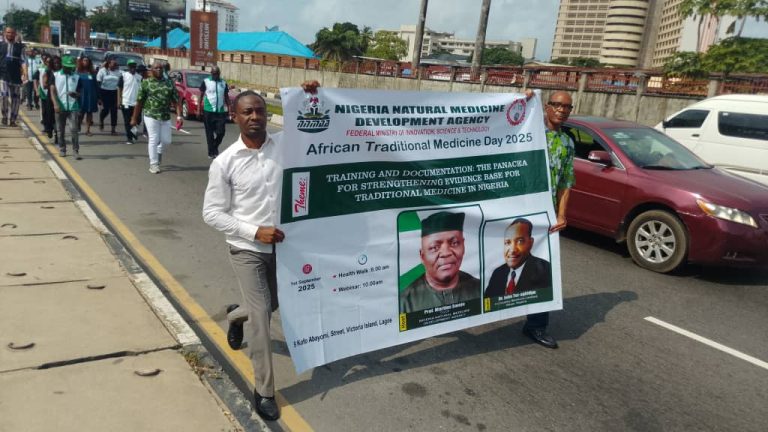The Nigeria Natural Medicine Development Agency (NNMDA) has called for major reforms to strengthen traditional medicine in the country. It said Nigeria must learn from countries like China and India by supporting indigenous healing practices with proper training, documentation, and institutional backing.
The agency made this call on Monday during a webinar held at its Lagos headquarters to mark African Traditional Medicine Day 2025. The annual event, celebrated on August 31, highlights the importance of traditional medicine in promoting health and well-being across Africa.
This year’s programme included a health walk and a lecture with the theme: “Training and Documentation: The Panacea for Strengthening the Evidence Base for Traditional Medicine in Nigeria.” Speakers explained that research and record-keeping would help make traditional medicine more credible in the country.
In his remarks, the Director General of NNMDA, Prof. Martins Emeje, said Nigerians should embrace traditional medicine openly. “People are often ashamed to talk about traditional medicine, but it has been part of our lives for centuries. If we want progress, our research must also respect our culture,” he said.
Delivering the keynote address, Dr. John Tor-Agbidye, a neurotoxicology’s and expert in integrative medicine, said there is an urgent need for structured training and proper documentation. He noted that about 70% of Nigerians depend on traditional medicine, yet most of the knowledge is passed down orally by healers, herbalists, and bone setters who often have little or no formal education.
“Training and documentation are key to building trust and credibility in traditional medicine,” Tor-Agbidye said. He added that this would help integrate traditional medicine into national health systems, boost innovation in drug discovery, and preserve Nigeria’s cultural heritage.
Tor-Agbidye advised Nigeria to copy global examples from China, India, and Cuba, where traditional medicine is supported by strong institutions and formal education systems. He called for stronger laws, the empowerment of the Traditional Medicine Council, the creation of colleges and documentation centres, and more research partnerships with universities and hospitals.
He pointed out that Nigeria’s rich biodiversity and the growing global demand for natural products could bring huge opportunities if remedies are properly tested and commercialized.
The expert appealed to the National Assembly to pass the long-delayed traditional medicine bill, which would provide a legal framework for training, research, and the sector’s development. He also urged partnerships with the government, private sector, and global organizations such as the Bill & Melinda Gates Foundation to secure funding and recognition.
“The World Health Organization (WHO) should expand training opportunities. Nigeria should also have its own national programme for training so that we don’t depend only on India and China,” he said.
Tor-Agbidye admitted that many Nigerians still doubt the safety of traditional remedies because most have not gone through clinical trials or safety tests. He stressed the need for agencies like NAFDAC to set standards and ensure product quality.
“To achieve global recognition, we must invest in innovation, safety, and clinical research. But this requires funding, collaboration, and above all, political will. Scientists working with traditional healers should also seek grants, as there are many opportunities available,” he added.
The event highlighted the wide scope of indigenous practices, including herbal medicine, bone setting, dieting, massage, and even surgical procedures. Stakeholders warned that if urgent steps are not taken, Nigeria risks losing centuries of indigenous knowledge to neglect.


